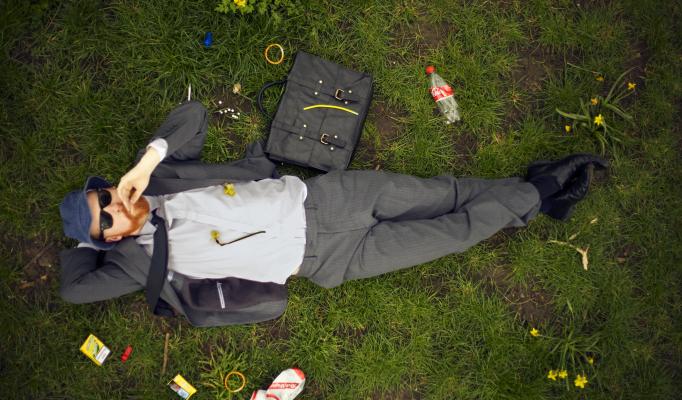The ageing raver might be a maligned figure in some circles, someone sneered at for never having managed to get to grips with “proper” things like marriages and mortgages and kids, but in Smoke and Oakum Theatre‘s cross-generational rave odyssey, he gets rehabilitated as a bringer of joy, a man in tune with the human spirit in a way that’s difficult to find in the 21st century.
Happy Dave, a man in his 40s, has the dull job in advertising, and the suit to boot, but being the man who once DJed to a field of 10,000 at an illegal rave, it doesn’t sit well with him. Nor is he impressed by the limited world view of his younger colleagues, stressed-out millennials whose aspirations stretch only to housing and jobs. He wants to show these Gen-Yers what life’s all about.
This plays out via two interweaving storylines set two decades apart. In the first, young Dave (Oli Forsyth) meets Molly (Helen Coles) on the Manchester rave scene at the time of Michael Howard’s infamous Criminal Justice Act. They begin organising their own events and end up running into The Law. In the second, old Dave (Andy McLeod) joins his colleague (Lucy Hagan-Walker) and friends on a night out, and in the manner of Crocodile Dundee with his knife pulls a “that’s not a rave; this is a rave” move on them that sees him back on the path to former glories.
It’s a good construct that allows the play to pick away at all sorts of interesting issues – generational tensions (Gen X v Gen Y, rather than the more obvious baby boomer angle), workplace politics, establishment control of the public… There’s even some North v South in there for good measure. Both Daves are strong and talk up rave culture very convincingly. Old Dave’s exclamations about seeing a crowd of bouncing ravers being the best feeling in the world is the kind of thing many an old DJ would spout. He also has some astute observations to make about what 21st century living has done to the soul. It is frequently funny, especially some of the verbal sparring between Old Dave and Kiell Smith-Bynoe who plays a baseball-capped member of the Gen Y cohort.
But in both storylines, the supporting characters are less convincing. Coles as Young Dave’s love interest Molly seems far too clean-cut to be a 90s raver. Dave might compare her to a “brickie” as a tease when she’s lugging round a sound system, but it just draws attention to how ill-fitting she is in this scenario. And the gaggle of sceptics-turned-fans who follow Dave on his journey are a motley crew, who seem unlikely co-conspirators. It’s hard to fully buy in to their transformation from bored office workers to police-dodging rebels.
With so many tensions being raised, the play also begs for a more decisive ending. Has this been the wake-up call Dave’s co-workers needed? Has this been a good purgative for Dave? Is raving really the solution to millennial office woes or just a short-cut to the slammer? There’s not enough to suggest what the onward trajectory might be. And, while we see the makings of old Dave in the final scene of young Dave, a few more links between the two would be useful.
It is good to see rave being used as a springboard for discussion of wider societal issues though, rather than just an excuse for nostalgia. Happy Dave gives audiences much to mull over, especially anyone either side of that generational divide.


Comments